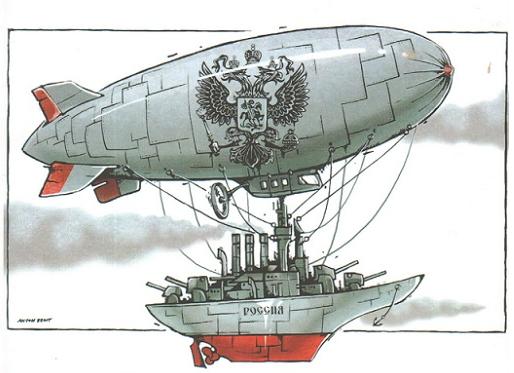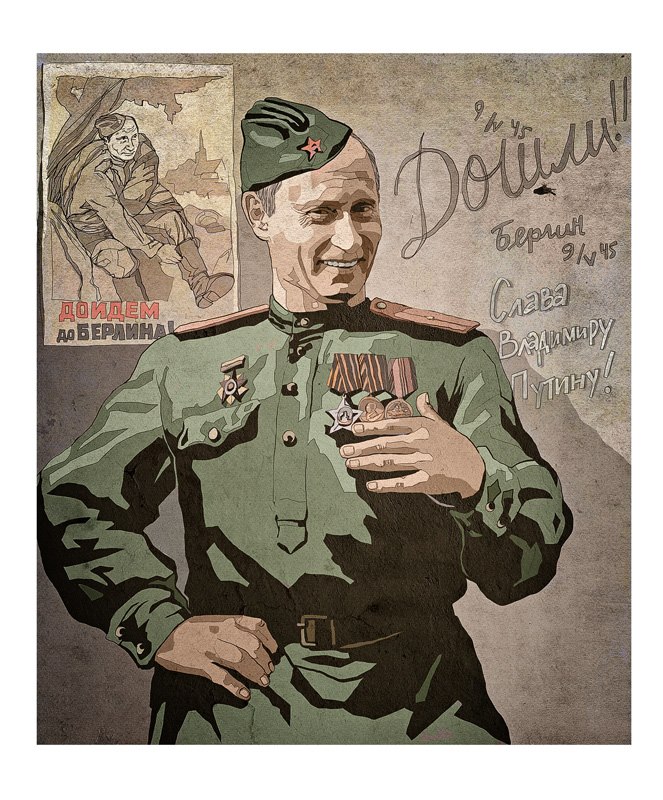The Kremlin’s aggression in Ukraine and its challenging actions toward NATO ships and plane are based on its “conclusion that the era of the West has ended” and that the world, including the West itself, accepts this and accepts the related notion that international relations is based on rules not based in liberal civilization, Lilia Shevtsova says.
The West’s failure to react forcefully, she suggests in a commentary today, only served to convince Vladimir Putin and those around him that they are right and the West is finished. But in fact, Western leaders “supposed that [Russia and the West] are working with the same set of understandings.”
How naive, she suggests. Clearly, these leaders failed to understand that their tolerant and patient stance was viewed by the Russian side “as weakness and a fear of taking decisions.” But things are changing, especially after the Crimean Anschluss forced the West to wake up to its mistakes and to take actions, admittedly halting but actions nonetheless.
An important sign of this trend, Shevtsova suggests, is a new report called “Closing NATO’s Baltic Gap,” prepared by three former NATO commanders, Wesley Clark, Egon Ramms, and Richard Shirreff and the former foreign and defense minister of Estonia, Juri Luik.
The Russian analyst calls attention to three of the report’s most important arguments.
- First, the authors say, Russia today is a “destabilizing” actor “both in the eastern and southern directions.”
- Second, Moscow has developed an effective system of shifting its forces rapidly from one place to another.
- And third, Russia has a command structure which is capable of taking decisions much more rapidly than does NATO. Indeed, the four remind that “the NATO command structures in the northern direction were liquidated,” something they clearly believe can and must be reversed given Russian actions.
The authors paint a bleak picture of the alliance: There are fewer Americans in uniform in Europe than there are policemen in New York, Britain would find it hard to field a combat-capable brigade, and Germany’s army is not ready for any large-scale operations at all. How can such an alliance threaten Russia, as the Kremlin claims?
But as a result of what the Kremlin has done and is doing, Shevtsova continues, the authors of the report who are freer to say “what they want” than those still in service are calling on the alliance to use its Warsaw Summit to develop a strategy of “tough containment” of the Russia of Vladimir Putin.
One has the impression, she says, that their views are far from marginal ones; and she points out that “if only a third of their proposals are realized,” Russia will find itself in a clash of forces with the West, a clash it cannot win because it spends less than 88 billion US dollars a year on defense while the NATO countries spend more than a trillion US dollars.
Can the Russian leadership really believe that the West won’t wake up? – Shevtsova asks; and can that leadership fail to remember what happened the last time there was such a military competition with the West – “the collapse of the USSR”? Admittedly, she says this was a case of “the law of unintended consequences.”
What Shevtsova does not address here, however is something others fear: a Kremlin driven back to the only basis of equality it has with the West in the military area – nuclear weapons – and its use of blackmail about their possible use designed to undermine Western resolve to do anything.
If that happens, the world will have entered into an era even more dangerous than any it has been in before, one in which a single mistake could lead to a nuclear Armageddon.
Related:
- Kremlin ‘really thinking about occupying Baltic countries,’ former RISI expert says
- Kasparov on the breakup of Russia, invasion of Baltics and end of Putin’s regime
- Could a Baltic-Black Sea alliance be taking shape?
- Russian war strategy and tactics give Moscow ‘the edge’ over NATO, Moscow analyst says
- From hope to disenchantment: Ukraine’s arduous road toward the EU and NATO
- New Russian geostrategy: Destabilize Ukraine, embroil the EU and NATO in arguments with each other
- Confirmation: NATO is not able to defend the Baltic states
- Putin’s nuclear brinkmanship betrays his military’s backwardness, Felgenhauer says
- Kremlin thinks West would not respond even to a small nuclear bomb attack, Kovalyev says






